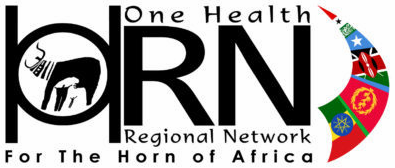
One Health is the concept that the health and well-being of people is linked to the health of their animals and the environment. It is nowhere more true than in the Horn of Africa (Kenya, Ethiopia, Eritrea and Somalia) where many people’s livelihoods are highly, or in some cases entirely, dependent on livestock. Animals are culturally, socially and economically vital in the region, but are also a source of human disease. Outbreaks of disease in animals thereby directly affect people’s health but also their wealth and nutrition. Livestock production and human health and well-being in the Horn of Africa can be increased through research, leading to improved agricultural systems; more food and less malnutrition; more financial resilience; and better detection, diagnosis, prevention and control of disease.
One Health Regional Network (HORN) is a multi-disciplinary, international partnership with a mission to improve the health and wealth of the people of the Horn of Africa by developing a One Health Regional Network – a network of individuals and organisations across the Horn of Africa that can undertake high quality research into the link between people’s health and wealth and that of livestock and the environment. HORN will strengthen the ability of organisations to undertake research by conducting research capacity assessments of partner institutions in the Horn of Africa and by providing training to non-research staff including leadership, research support, and laboratory skills. HORN will advance the knowledge and research skills of researchers in generic, laboratory and subject-specific skills and will undertake basic and applied research in the area of One Health, to create the One Health Regional Network.
Centre for Capacity Research Objectives
Researchers within the Centre for Capacity Research will undertake structured assessments of partner institutions to assess research management and support capacities as well as strengths and weaknesses in current one health research capacity. Findings from the baseline assessment will then be used to identify priority, institution-level capacity gaps that HORN will aim to address over the course of the programme. Along with institutional capacity assessments, a bespoke reflective learning programme will be conducted, the outcomes from which will inform programme level decision-making regarding allocation of consortia resources and/or implementation of consortia activities.
The work will build on the Centre for Capacity Research's growing experience providing institutional capacity assessments (ICA) and reflective learning programmes (RLP) in support of research capacity strengthening (RCS) consortia. By implementing both ICAs and RLPs through robust, transparent, and transferable processes, and through publishing the processes and outcomes in peer-reviewed journals, the proposed research will also contribute to the development of the fledgling evidence base pertaining to RCS implementation. Thus, the proposed research will enhance HORN consortia outcomes and produce knowledge to advance the evidence base in the area of RCS design and implementation more broadly.
The HORN project is also part of a wider platform, comprised of multiple sub-Saharan African RCS consortia, in which CCR is applying a standard set of predetermined indicators to track and document institutional-level research capacity strengthening outcomes and to answer priority ‘cross-programme’ research questions in an effort to strengthen the RCS evidence-base. GCRF funded programmes in this platform include: Partnership for Increasing the Impact of Vector Control (PIIVeC); One Health Regional Network for the Horn of Africa (HORN); and Strengthening Capacity in Environmental Physics, Hydrology and Statistics for Conservation Agriculture Research (CEPHaS).


